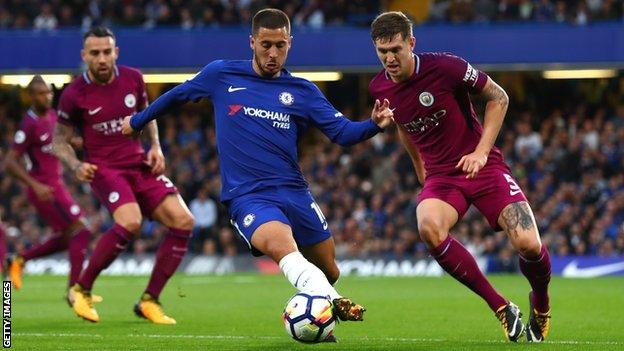Premier League TV rights: Clubs reject initial proposal for distribution of overseas money
- Published

Chelsea and Manchester City are two of the teams applying pressure for a new deal
Premier League clubs have rejected an initial proposal to end the equal distribution of overseas TV money.
The six richest clubs - Manchester City, Manchester United, Tottenham, Arsenal, Liverpool and Chelsea - want their appeal reflected in their income.
And a plan - presented by the league's executive chairman Richard Scudamore - suggested 35% of global revenue should be divided based on league position.
But at a meeting on Wednesday, no vote was taken due to a lack of support.
"Clubs agreed to adjourn to allow further discussion," a statement read.
It had become clear during the meeting that the plan was significantly short of gaining the support of the 14 clubs needed for it to be passed.
The issue will be discussed again at the next meeting of club bosses in November.
Speaking after his appearance at the Sport Business Summit at Stamford Bridge, Swansea co-owner Steve Kaplan told BBC Sport: "Everyone came into the room with good intentions. I think they still have good intentions. I'm optimistic."
The £3bn overseas deal for 2016-19 generates £39m annually for each club - and for the previous 25 years there has been an equal sharing of international broadcasting income between the clubs.
But new contracts for international markets such as China and the United States for the next period between 2019 and 2022 have been booming in value, and the big six clubs want a greater share.
Analysis
The atmosphere at the crucial meeting at a smart London hotel was described by one insider as "calm, cordial and composed", but the unity of the Premier League is being tested more than at any stage in its 25-year history.
Richard Scudamore's initial plan to appease the "Big Six" by giving them a bigger slice of overseas TV revenue is effectively over. With 14 clubs needed to approve such a significant change in strategy, it is no real surprise.
However, the fact that the discussion has merely been adjourned and will resume in three weeks' time, suggests the smaller clubs are open to some form of compromise and may cede some ground to avoid the split with their richer rivals widening.
Could that mean a smaller proportion than 35% being shared based on league position? And if so, would that be enough to satisfy the "Big Six", and end talk of a possible breakaway and a European Super League? This power struggle is far from over, and a resolution is still possible.